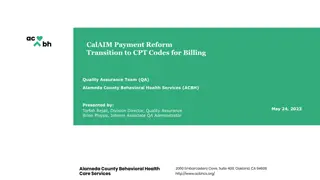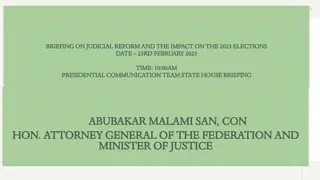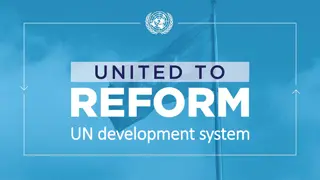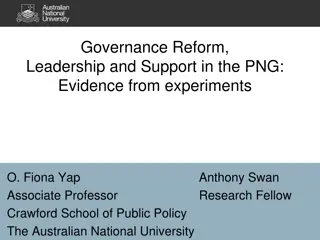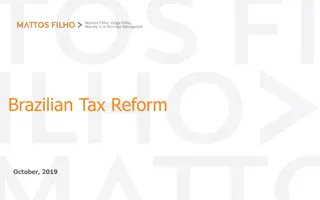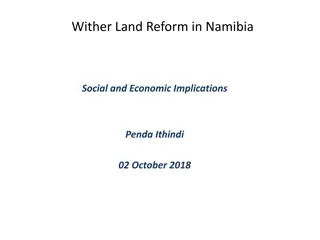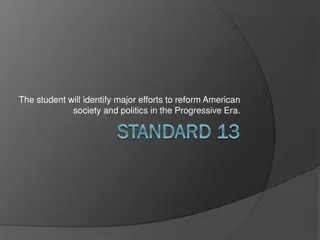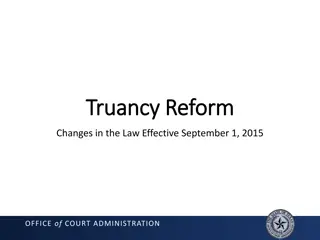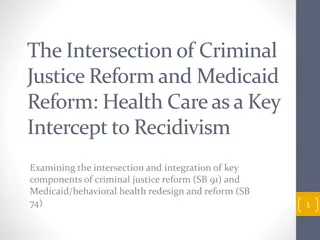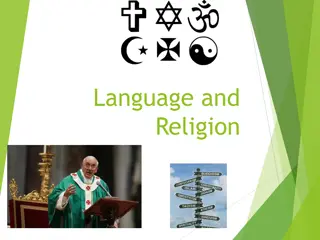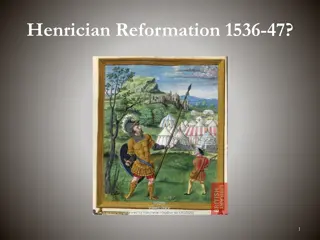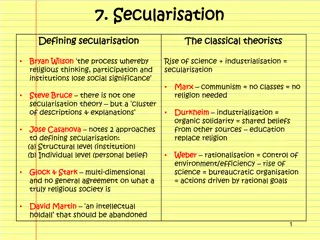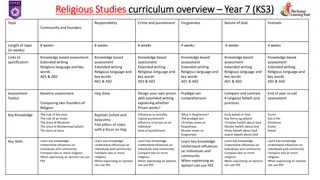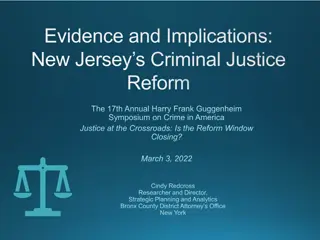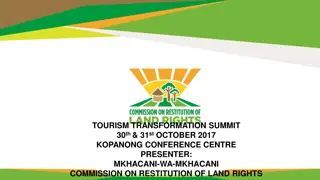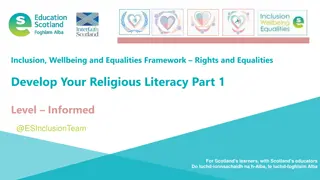Tertiary Education Reform in Wales: Enhancing Learning Opportunities
Tertiary Education Reform in Wales aims to establish the Commission for Tertiary Education and Research, dissolve the Higher Education Funding Council for Wales, and enhance oversight and funding for further and higher education institutions. The reform seeks to address gaps, improve alignment with
2 views • 21 slides
Status of Family Laws in India: Hindu vs. Religious Minorities
The family and personal status laws in India vary between Hindu law and those pertaining to religious minorities. While Hindu law has seen extensive reforms, discriminatory provisions still exist. In contrast, laws governing religious minorities have undergone fewer reforms, leading to greater inequ
2 views • 4 slides
CalAIM Payment Reform Transition to CPT Codes for Billing Quality Assurance Team
The CalAIM Payment Reform initiative starting July 1, 2023, entails changes in reimbursement structures, financing mechanisms, and provider billing methods for county BH plans, with a transition to CPT coding and SmartCare system. Service entry requirements for legacy systems and SmartCare are outli
3 views • 43 slides
Sustainable Development as Fundamental Pillar of Global Economic Governance Reform
The need for reform in global economic governance is emphasized for achieving sustainable and shared growth. Key issues include debt burden reduction, sustainable finance increase, and international trade system improvement. International commitments on human rights and sustainable development are n
1 views • 7 slides
Understanding Religious Conflict: Definition and Types Explored
Religious conflict is a complex and recurring concept throughout history. Scholars have defined it as disagreements between religious groups. This conflict arises from contentious issues touching on ideology, morality, power, and identity, influenced by various socio-political, economic, and cultura
1 views • 13 slides
Evolution of Akbar's Religious Policy: A Historical Overview
In the 16th century, Akbar the Great implemented a revolutionary religious policy in the Mughal Empire. Initially a devout Sunni Muslim, Akbar evolved his stance to promote harmony and equality among all religions, fostering tolerance and understanding. This shift marked a significant departure from
1 views • 25 slides
Overview of Vietnam Energy Sector Reform and Market Development
Vietnam's power sector reform and market development have been key drivers in transitioning from a central planning economy to an open-market economy. This reform aims to adapt to global economic changes, enhance competitiveness, and ensure sustainable growth in the rapidly evolving energy landscape
0 views • 20 slides
Elizabethan Religious Settlement: Unity Amidst Division
Amid religious division in England, Queen Elizabeth I implemented a Religious Settlement in 1559 to unify the country. The settlement, a blend of Protestant and Catholic elements, aimed to maintain peace and prevent rebellions. Elizabeth's strategic compromise pleased most people, though lingering t
0 views • 14 slides
Understanding Secularism: Principles and Advantages
Secularism is the principle of separating government institutions from religious entities to ensure equal rights for believers and non-believers. It safeguards freedom of religious belief and practice, upholds religious freedom, and promotes democracy and fairness. Secularism aims to prevent religio
0 views • 21 slides
Briefing on Judicial Reform and its Impact on the 2023 Elections
On February 23, 2023, a briefing was held by the Presidential Communication Team at the State House, led by Hon. Abubakar Malami SAN, the Attorney General of the Federation and Minister of Justice. The briefing discussed the Constitutional and Electoral Reform Committee's initiatives, the Justice Se
0 views • 15 slides
Reform of the UN Development System and Its Impacts
The reform of the UN Development System (UNDS) brings significant changes to enhance its support for countries in achieving the Sustainable Development Goals (SDGs). It aims to make the UNDS more coherent, accountable, and effective, with a repositioned identity as a trusted partner for advancing th
0 views • 18 slides
Understanding Religious Language: Cognitivism vs. Non-Cognitivism in the University Debate
This discussion explores the debate between cognitivism and non-cognitivism in religious language. Cognitivism asserts that religious claims aim to describe the world and can be true or false, while non-cognitivism argues that such claims express attitudes and cannot be verified. Flew's challenge qu
0 views • 9 slides
Governance Reform and Leadership Support in PNG: Insights from Experiments
This research delves into the conditions under which citizens support governance reform and take up leadership roles to garner broad support for reform in Papua New Guinea. It highlights the significance of citizen demand and government supply of reforms, addressing the implications of individual ch
1 views • 18 slides
Overview of Brazilian Tax Reform Proposal
The Brazilian Tax Reform proposal in October 2019 aims to address challenges in the current tax system by introducing changes such as a broader tax basis, simplification, and centralized collection. The proposal includes various key elements like PEC 45/2019, PEC 110/2019, and PEC 128/2019, aiming f
3 views • 5 slides
Implications of Land Reform in Namibia: Social and Economic Insight
Land reform in Namibia is crucial for inclusive growth and shared prosperity, with access to land being a key factor. Productive land usage can lead to wealth creation and social development. The importance of agriculture in the economy is highlighted, along with the need for skilled farmers and a s
0 views • 7 slides
Efforts to Reform American Society in the Progressive Era
Major reform efforts in the Progressive Era included Upton Sinclair's expose of the meatpacking industry in "The Jungle," resulting in federal oversight. Women played a significant role in reform movements, with Jane Addams establishing Hull House to aid immigrants. The era also saw the rise of Jim
0 views • 34 slides
Guide to Using the BSA Calendar of Religious Observances
The BSA Calendar of Religious Observances is a valuable resource for scheduling scouting events in consideration of various religious holidays and observances. This guide provides an overview of the calendar, highlights important dates, and emphasizes the importance of respecting religious diversity
0 views • 8 slides
Truancy Reform: Changes in Legislation Effective September 1, 2015
The truancy reform laws underwent significant changes effective September 1, 2015, with the passing of House Bill 2398. Prior to this date, truancy cases were handled as criminal or civil cases, with specific procedures for both. The reform repealed certain sections and enacted a new chapter in the
3 views • 29 slides
The Intersection of Criminal Justice Reform and Medicaid Reform: Health Care as a Key Intercept to Recidivism
This study examines the integration of criminal justice reform (SB 91) and Medicaid/behavioral health redesign and reform (SB 74) in Alaska. It highlights the history of SB 91, the problems faced by the state's prison system, findings from data analysis, and the impact of SB 91 in reducing the inmat
1 views • 45 slides
Federal Lending Update and Housing Finance Reform Overview
The VA 2019 Lenders Conference provided insights on the positive economic environment, unique features of the VA Home Loan Program, and the President's plan to reform the housing finance system. Encouraging demographic trends and the goals of the reform were discussed, emphasizing reduced taxpayer r
0 views • 21 slides
Understanding the Role of Language in Religion
Exploring the significance of language in religious contexts, this content discusses the functions, features, lexicon, grammar, and metaphorical aspects present in religious language. It delves into how religious language upholds spiritual beliefs, persuades believers, and expresses specific attitud
0 views • 8 slides
Understanding the Cultural Dimensions of Food and Religious Influences in Culinary Arts
Explore the impact of religious beliefs on food traditions and dietary restrictions across different cultures in the culinary world. Learn about the influence of major world religions on eating habits, food choices, and culinary practices. Discover how various religious groups, such as Christians, o
0 views • 26 slides
The Vital Role of Religious Institutions in Supporting Immigrants
Religions and immigration are interlinked in modern societies, where religions play a significant role in providing services, defending rights, and supporting the social cohesion of immigrants. Mainstream religious institutions serve as key actors in offering assistance, advocating for migrant right
2 views • 14 slides
Understanding Religious Language: Flew, Hare, Mitchell
Exploring the contrasting views of cognitivism and non-cognitivism in the context of religious language through the perspectives of Flew, Hare, and Mitchell. Delve into Flew's challenge on the undetectable gardener, Hare's concept of bliks, and Mitchell's response to the rationality of religious bel
0 views • 7 slides
Religious Accommodation in the Army: Advising Command
The content discusses the role of the Chaplain Corps in advising Soldiers and leaders on religious accommodation in the Army as of February 13, 2019. It covers learning objectives, legal foundations, Army policies, procedures, recent changes, and references related to religious accommodation. The in
0 views • 36 slides
Toolkit for Energy Sector Reform: CAREC Energy Reform Atlas
Explore the CAREC Energy Reform Atlas, a virtual toolkit supporting energy sector reform. This comprehensive resource addresses key dilemmas faced by policymakers during the reform process, focusing on areas like Tariff Reform, Unbundling, and Vulnerable Consumer Protection. Access interactive featu
0 views • 5 slides
Henrician Reformation of 1536-47 - Overview of Key Terms and Influences
The Henrician Reformation of 1536-47 was a period of religious change in England, involving shifts in beliefs, worship practices, and organizational structures. This reform was driven both from above, by rulers imposing changes, and from below, with support from ordinary people. Key terms such as Re
0 views • 24 slides
Understanding Religious Discrimination Laws in California Workplace
Learn about the regulations and protections under FEHA and Title VII in California, including religious exemptions, accommodation requirements, case studies, and best practices to address discrimination issues effectively. Discover the statistical insights on religious discrimination complaints and
0 views • 45 slides
Understanding Secularisation: The Decline of Religious Influence in Society
Secularisation refers to the process in which religious thinking, participation, and institutions lose their social significance. This phenomenon is influenced by factors such as the rise of science, industrialisation, changing social attitudes, and the disengagement of the church from society. Evid
0 views • 8 slides
Philosophers' Views on Religious Experience: Insights and Critiques
This lesson delves into the perspectives of various philosophers such as Rudolph Otto, Richard Swinburne, John Hick, and Michael Persinger on religious experiences. It explores concepts like the numinous, religious knowledge, God's existence, and criticisms on the validity of religious experiences.
0 views • 7 slides
Philosophers' Views on Religious Experience: Insights from William James
Explore William James' perspective on religious experiences, including his views on existential and value judgments. Understand how James argued for the validity of religious experiences and their potential proof of God's existence. Delve into the implications of emotions and prior beliefs on interp
0 views • 7 slides
Religious and Social Conflicts Fueling the Rise of Absolutism in Europe
Social, economic, and religious conflicts in Europe played a significant role in the emergence of absolutism where monarchs wielded supreme power without sharing it with legislative bodies. Events like Spain's religious conflicts, Protestantism in England, the Spanish Armada, religious conflict in t
0 views • 10 slides
Religious Pluralism and Civil Society: A Paradox in Government Control
Understanding the intricacies of religious pluralism in the context of government control reveals a paradox where restricting religion can hinder social cohesion and economic growth. Through insights on the counterproductivity of control, the role of religious organizations in civil society, and the
0 views • 16 slides
Comparison of Economic Reform Sequencing in China
Andrew K. Rose from NUS Business School compares China's economic reform sequencing with the Washington Consensus. The optimal reform sequencing includes stabilization before reform, real before financial reform, and domestic before international reform. China's approach aligns oddly with the Washin
0 views • 14 slides
US Religious Freedom Restoration Act (RFRA) Overview
The US Religious Freedom Restoration Act (RFRA) aims to protect the free exercise of religion by ensuring that governments do not substantially burden religious practices without compelling justification. It emphasizes striking a balance between religious liberty and governmental interests through t
0 views • 9 slides
Religious Studies Curriculum Overview for Year 7 and 8 (KS3)
Explore various topics such as responsibility, crime and punishment, forgiveness, nature of God, festivals, community, founders, worship, creation, life after death, rules and laws, relationships in this detailed Year 7 and 8 (KS3) Religious Studies curriculum. The curriculum includes assessments, e
0 views • 6 slides
Impact of Criminal Justice Reform in New Jersey
Evaluation of New Jersey's Criminal Justice Reform (CJR) reveals a significant shift towards a risk-based pretrial system, with a reduction in misdemeanor arrests and changes in case processing post-reform. The reform led to fewer warrant-issued cases, a decline in misdemeanor offenses, and altered
0 views • 12 slides
Land Reform Mandate and Rural Development Strategies in South Africa
The 1996 Constitution of South Africa outlines the land reform framework, emphasizing equitable access to land for citizens. The 2011 Green Paper on Land Reform emphasizes minimal disruption to agriculture and rural economy transformation. National Development Plan Chapter 6 focuses on rural communi
0 views • 16 slides
Developing Religious Literacy for Educators in Scotland
This resource aims to enhance educators' understanding of religious literacy by exploring religious discrimination, core beliefs of major faiths, and additional learning sources. It encourages educators to consider the needs of learners in relation to their religious beliefs in Scotland.
0 views • 30 slides
Settling the Northern Colonies: Religious Transformation and Colonization
The Protestant Reformation led to the emergence of Puritanism in the Northern Colonies, with figures like Martin Luther and John Calvin shaping religious beliefs. The Massachusetts Bay Colony stood as a beacon of self-government and religious ideals, while dissenters like Anne Hutchinson and Roger W
0 views • 9 slides


